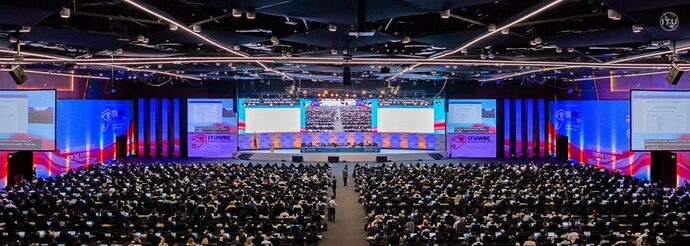On November 20, 2023, the World Radiocommunication Conference (WRC-23) kicked off in Dubai, UAE -to review & update the Radio Regulations
Few key discussions:
![]() The allocation of spectrum for new technologies:
The allocation of spectrum for new technologies:
Delegates discussed the need to allocate spectrum for new technologies such as 5G & satellite broadband. There was a general consensus that these technologies have the potential to revolutionize the way we communicate and that they need access to sufficient spectrum to operate effectively.
![]() The management of interference:
The management of interference:
Delegates discussed the need to develop new methods for managing interference between different types of radio systems. Interference can cause problems for a variety of users, including broadcasters, mobile phone operators, satellite operators.
![]() The protection of critical infrastructure:
The protection of critical infrastructure:
Delegates discussed the need to protect critical infrastructure, such as power grids & transportation systems, from harmful interference. Harmful interference can disrupt the operation of these systems & pose a serious threat to public safety.
The discussions on these issues will continue throughout the conference. The delegates will ultimately need to reach consensus on a number of complex issues, such as how much spectrum to allocate to each technology and how to protect critical infrastructure from interference.
Key issues were discussed on the 1st day of the conference:
![]() The need for a flexible & efficient spectrum allocation system:
The need for a flexible & efficient spectrum allocation system:
Delegates discussed the need for a spectrum allocation system that is flexible enough to accommodate new technologies & efficient enough to make the most of the limited spectrum resource.
![]() The importance of international cooperation:
The importance of international cooperation:
Delegates discussed the importance of international cooperation in managing the spectrum. The radio spectrum is a global resource, it is important that countries work together to ensure that it is used efficiently & effectively.
![]() The need to protect the interests of developing countries:
The need to protect the interests of developing countries:
Delegates discussed the need to protect the interests of developing countries in the spectrum allocation process. Developing countries often have limited resources, it is important that they are not disadvantaged in the competition for spectrum.
Key Highlights
![]() The inclusion of NTN in 3GPP 5G standards & the development of technology that supports the development D2D services can be seen as a gamechanger on spectrum use
The inclusion of NTN in 3GPP 5G standards & the development of technology that supports the development D2D services can be seen as a gamechanger on spectrum use
![]() Implications for D2D & the future agenda item- studies for additional bandwidth on mobile satellite services in technically appropriate frequency bands
Implications for D2D & the future agenda item- studies for additional bandwidth on mobile satellite services in technically appropriate frequency bands
![]() Currently, existing & compliant D2D emergency-type messaging solutions are serviced by MSS operators, with many technical & bandwidth constraints. WRC-23 now has the critical role of deciding whether the 2023-2027 study cycle should prioritize an agenda item that allows MSS operators to further connect smartphone users when they are out of terrestrial coverage
Currently, existing & compliant D2D emergency-type messaging solutions are serviced by MSS operators, with many technical & bandwidth constraints. WRC-23 now has the critical role of deciding whether the 2023-2027 study cycle should prioritize an agenda item that allows MSS operators to further connect smartphone users when they are out of terrestrial coverage
